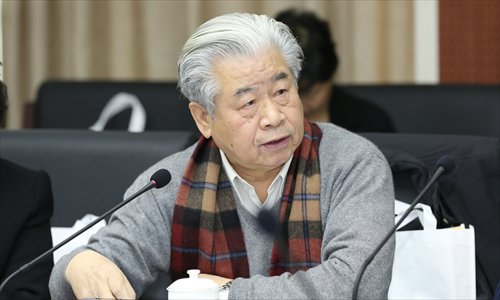Film puts Japan’s invasion under global lens

Zhang Haipeng
Editor's Note:
A Chinese documentary Truth and Denial - Germany and Japan's Postwar Redemption will be broadcast in eight languages: English, Russian, French, Germany, Japanese, Korean, Spanish and Arabic to mark the 70th anniversary of the end of WWII. The 90-minute documentary compares the different attitudes of Germany and Japan toward the war. What is the significance of such a documentary? Global Times (GT) reporter Liu Jianxi talked with Zhang Haipeng, a research fellow with the Institute of Modern History at the Chinese Academy of Social Sciences, about these issues.
GT: Following its huge popularity in China, Truth and Denial - Germany and Japan's Postwar Redemption will be broadcast in eight languages. What might the impact of the documentary be on the world?
Zhang: I hope people from all over the world can get to know the history of WWII and the totally different attitudes toward history Germany and Japan have taken. The more people know about this, the better.
Truth and Denial compares Germany and Japan's different views on their role in WWII. It is expected to evoke some repercussions after being broadcast in foreign languages. The current situation in Europe and East Asia, where European countries are working in unity and solidarity while tensions are simmering between Japan and its neighboring countries, is related to the differing perceptions of the war in Germany and Japan. The documentary, if broadcast in differing languages, will deepen the world's understanding of the two countries, of the situation in Europe and Asia, and of the China-Japan relationship.
GT: Westerners are not very familiar with the War of Resistance against Japanese Aggression (1937-45) and have not regarded the battles in the Asia-Pacific theater during WWII as having equal importance to those in the European theater. To what extent has this affected Japan's view on history?
Zhang: China was a semi-colonial and semi-feudal society during WWII. It was weak and its economy lagged far behind that of Europe and Japan. Therefore, European countries, during the war, did not give China's War of Resistance against Japanese Aggression an important position.
The Imperial Rescript on Surrender, delivered by Emperor Showa on August 15, 1945, only acknowledged the war after the Pearl Harbor attack in 1941. The war before 1941, including Japan's invasion of China, which had been carried out for about four years by 1941, was excluded from the rescript. This means Japan looked down upon China at that time. Be it Japan or the Western countries, they did not regard China's efforts in WWII highly.
The world undervalued the role of China, which at that time had spent eight years combating Japan. The social elite and the media should take up the responsibility to promote the global understanding of the contribution and the hardness of China's eight-year war of resistance. Besides the US and the Soviet Union, China played a pivotal role in combating Japan's militarism. China's eight-year war supported those two countries as well. Without China's battle, it is likely that Japan may have invaded parts of the Soviet Union and Hawaii.
It was China's battlefield that held up about 80 percent of the Japanese armed forces. The world should be clear about this.
From my point of view, Truth and Denial, if broadcast in different languages, can educate people about the important role of China in WWII. It will help formulate international pressure on Japan's militarism.
GT: While movies featuring Nazi violence are prevalent, there are not many movies revealing Japan's wartime atrocities that are broadcast internationally. To what extent has this influenced Japan's reluctance to face up to wartime past?
Zhang: Truth and Denial educates people by presenting the historic facts. Many Westerners lack even basic knowledge of Japan's violence on China's battlefield, and therefore I think we should help people from all over the world to know better of these historic facts. By revealing Japan's and Germany's different views on history, Truth and Denial is undertaking this role. This is important to the whole world.
GT: What has to be done to push the Japanese government to make a change?
Zhang: For one thing, we should unveil Japan's actions during the war. For another, we should strive to further improve China's international status. China was of low prestige during the war and that was the reason why it didn't receive its due credit for its contribution and efforts in WWII.
GT: While the international community has formed a consensus against Nazism, Japan's militarism still exists and is even honored by some right-wing politicians. What can be done to build global consensus to combat militarism?
Zhang: The punishment against Germany for its wartime crimes was thorough. However, many Japanese criminals escaped punishment in the International Military Tribunal for the Far East trials.
Germany still works on its law to punish Nazi criminals. Japan's political leaders, on the other hand, pay visits to the Yasukuni Shrine, where 14 war criminals were consecrated.
GT: According to the documentary, Japan, in its public discourse, law, education and other cultural activities, is trying every means to whitewash its wartime past and has shown itself as reluctant to face up history. What are the consequences of this behavior on the rest of the world?
Zhang: Japan's view on history will have negative effects on the security and development of Asia and even the whole world. From my point of view, the possibility that Japan will again become the source of war exists, and this is something that the whole world should be alert about.
Right-wing militarism thoughts are spreading. Japan's worship of its war criminals means that Japan may again become the hotbed of war. Whether or not Japan will, in reality, start a war hinges on many complicated factors and it is hard to predict. But the possibility exists.